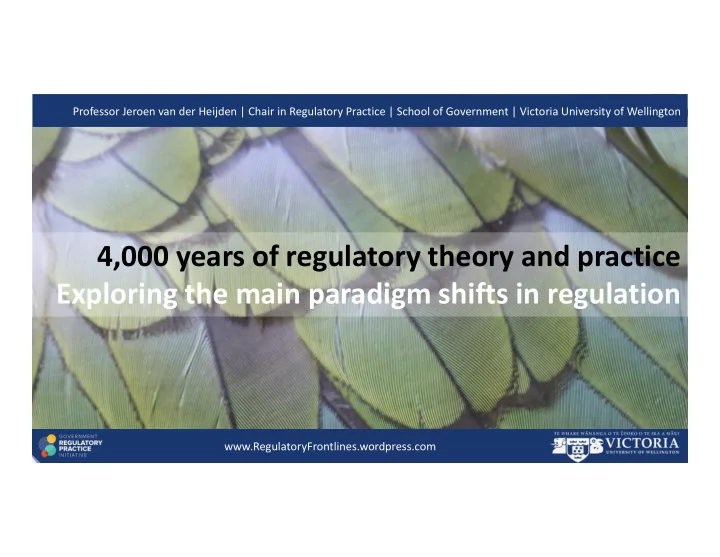

Professor Jeroen van der Heijden | Chair in Regulatory Practice | School of Government | Victoria University of Wellington 4,000 years of regulatory theory and practice Exploring the main paradigm shifts in regulation www.RegulatoryFrontlines.wordpress.com
• Evolution of regulation Outline • Main paradigm shifts since 20 th C • Do charities need to be regulated? www.RegulatoryFrontlines.wordpress.com
• Codex Hammurabi • Ca 1750 BC Evolution of • System of prescriptive rules regulation and penalties for non-compliance www.RegulatoryFrontlines.wordpress.com
• Greek and Roman influence Evolution of (ca. 600 BC – 600 AD) • Further regulation codification of rules and penalties • Focus on commerce, property and bodily harm www.RegulatoryFrontlines.wordpress.com
• Middle ages (ca. 600 – 1600 AD) • The body as Evolution of target of punishment regulation • Deterrence becomes a spectacle www.RegulatoryFrontlines.wordpress.com
• Renaissance, Enlightenment, and Evolution of Early Modernity (16 th – 19 th C) • Birth of leniency regulation • Punishment becomes an administrative ritual to correct www.RegulatoryFrontlines.wordpress.com
• For more than 3,700 years ‘regulation’ In sum meant: • Hierarchy • Intrusive • Deterrence based • Prescriptive • Static • One size fits all • Yet, from beginning of 20 th Century onward, regulatory friction becomes problematic www.RegulatoryFrontlines.wordpress.com
• Insights that people do not just comply because they ‘fear’ consequences of non- Paradigm compliance shift #1 • Move towards compliance- based regulation and positive incentives Compliance motivations • Ca. 1970s www.RegulatoryFrontlines.wordpress.com
• Growing externalities (risks) because of industrialization and globalization Paradigm • Declining acceptance of fate shift #2 • Call on governments to be cost-effective (New Public Risk Management) regulation • Ca. 1980s www.RegulatoryFrontlines.wordpress.com
• Mixing incentives • Facilitating first, friction later Paradigm • Role of street-level shift #3 bureaucrat essential to achieve compliance Responsive regulation • Ca. 1990s www.RegulatoryFrontlines.wordpress.com
• Growing critique to neo- classical model of rationality Paradigm • Heuristics and biases shape behavior shift #4 • ‘Nudge’ choice rather than limit choice Behavioural insights • Ca. 2000s www.RegulatoryFrontlines.wordpress.com
• Systems thinking • Horizontal coordination Paradigm • Collaboration and shift #5 deliberation in rule-making and implementation Better • Regulatory review and update regulation • Ca. 2010s www.RegulatoryFrontlines.wordpress.com
• Over the last 50 years ‘regulation’ has In sum become to mean: • Panarchy • Collaborative • Mixed incentives • Goal based • Flexible • Tailored • Response to ongoing calls for less regulatory friction and more regulatory facilitation www.RegulatoryFrontlines.wordpress.com
• Regulation is a specialism Should charities be regulated? www.RegulatoryFrontlines.wordpress.com
• It requires regulatory experts (topical) and regulatory generalists (system-wide) Should • It requires a regulatory profession, with shared charities be norms and values • It requires an holistic vision regulated? of the regulatory system, the role of actors and organizations in it, and the ethics of individuals at all levels of the system www.RegulatoryFrontlines.wordpress.com
• Regulation is a specialism • In my opinion, absolutely (for Should all of the above reasons) charities be • It remains at question, however, whether the NZ government is capable to regulated? regulate charities well in today’s complex regulatory environment www.RegulatoryFrontlines.wordpress.com
Professor Jeroen van der Heijden Chair in Regulatory Practice Thank you School of Government Victoria University of Wellington Honorary Professor School of Regulation and Global Governance Australian National University jeroen.vanderheijden@vuw.ac.nz www.RegulatoryFrontlines.wordpress.co m www.RegulatoryFrontlines.wordpress.com
Recommend
More recommend